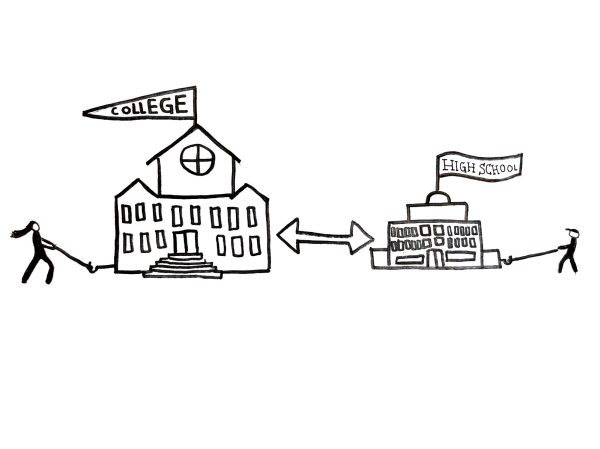The Problem with Idolizing Toxic Male Characters in Media
Some of my favorite TV shows and movies are those that feature the anti-hero: an unconventional and unheroic protagonist. This character is intended to be enjoyed, but not necessarily rooted for by the audience. But what happens when the intentions of these characters are misinterpreted? What happens when this “anti-hero” is believed to be a hero?
My questioning towards this subject began after the 2019 release of The Joker, which surrounds the infamous DC villain’s descent into evil. This film soon became one of the most popular movies of 2019, gathering box-office earnings of over one billion dollars, as well as numerous Academy Award nominations. The Joker is a character not meant to be idolized, as explained by star Joaquin Phoenix. The intention behind the movie’s portrayal of the joker was to simply be a “character study.” The response to The Joker was not as intended, as the murderous villain became somewhat of an idol to some viewers. The character’s experience with rejection and failure unfortunately resonated with self-pitying and emotionally unstable men. I feel that film critic David Ehrlich said it best in his review of the film: “That perspective allows Phillips to feign an apolitical stance and speak to the people in our world who are predisposed to think of Arthur as a role model: lonely, creatively impotent white men who are drawn to hateful ideologies because of the angry communities that foment around them.”
Additionally, a similar reaction was met surrounding the Netflix Original Series Bojack Horseman. Unlike The Joker (sorry, guys), I thoroughly enjoyed this six-season animated series. This show surrounds a washed-up, Hollywood D-lister trying to navigate life after fame while battling addiction and mental illness. This adult-animation sitcom was created as a critique of Hollywood, mocking the idea of stardom and acknowledging flaws in the industry. Creator Raphael Bob-Waksberg chose to include topics such as the #MeToo movement, addiction and forgiveness. Bojack, our protagonist, is not made to be a likable character; he ruins the lives of everyone around him and is a selfish narcissist. However, similarly to The Joker, certain viewers saw Bojack as a good, relatable character. He is said to have Borderline Personality Disorder, a mental illness highlighted by patterns of sharply varying moods and self-image. To some, Bojak was seen as a healthy example of dealing with mental illness—which he definitely is not. The unrelated toxicity of his character not only further stigmatizes this disorder, but it makes those certain viewers believe that his actions are justified. With the justification of Bojack’s life-ruining actions, his character is seen as a role-model, and the true intentions behind the series are completely disregarded.
Unfortunately, with the accessibility of media and the constant progression of technology, shows and movies like these are accessible for almost anyone. Although they’re made for mature and responsible audiences, they can easily fall into the wrong hands. Even with well-made and introspective pieces such as the ones I mentioned, as well as many more, no one can control how they can be interpreted. The only thing I can advise is to separate fictional characters from reality, and to all the guys who have told me that they look up to The Wolf of Wall Street’s portrayal of Jordan Belfort (who is a real person who received real consequences): please stay away from me.

Stella Hofferman is a senior at Boulder High. She has always enjoyed writing from a young age and is planning on majoring in Journalism at university. As a Sagittarius–who are known to speak their mind–Stella is not afraid to express her opinions to a large audience. When Stella is not writing, she can be found rummaging through a thrift store or analyzing a horror film. She enjoys fashion, cinema, astrology, and irritating her peers with her loud and annoying sense of humor. By joining The Owl, Stella hopes to share her love of the arts and carry on the legacy of world-renowned writers such as former Boulder High student Alexis Herrington. Stella is known to be a proud green grape supremacist,...






Ben • Dec 14, 2020 at 11:00 pm
I think this is a really important issue in cinema but in society in general. We idolize those who are anti-heroes sometimes as they seem “relatable or cool”. I personally got this feeling from the Joker movie that many people greatly overestimated how powerful and important of a character the Joker actually was and I think your article agrees with this perfectly. Great article overall and super cool stance.
Lilja • Dec 14, 2020 at 5:30 pm
I think you explained this topic very well within this article. The idolization of toxic characters is something I see a lot online and with people I personally know. I think you made a very important point when you stated that most characters that are purposefully problematic in order to raise awareness for mental health are idolized for their toxicity, and not their essential purpose as a character. I think this was a super interesting read and I loved your writing and thoughts on the topic!
Ellie Miller • Dec 14, 2020 at 2:49 pm
This topic is so important! I love the specific examples that you gave. I think that you made a great point about how these are meant for more mature audiences, but can fall into the wrong hands. Younger kids have something that other generations did not: complete access to almost everything via the internet. By idolizing these toxic characters, children could see this and begin to copy some of the same behaviors and traits. We must make better efforts to separate good from bad, and immoral from moral.
Laurel Gabbard • Dec 13, 2020 at 5:34 pm
This is a really awesome article! I definitely think it is essential to be careful with what the audience, especially younger audiences, might take from a movie or show. Today, we tend to learn a lot from the media, and as younger kids see these people in the media and see a possibly problematic character portrayed by some people as a good character and a good figure, kids might get the wrong idea and begin to idolize them. Unless people have the ability to see how that character is actually toxic and not the best, we have to be careful with who we look up to and idolize, character-wise.
Grace • Dec 12, 2020 at 8:47 pm
This is a great article on an interesting topic. It is hard to have media that is focused on ambiguous characters and plot lines that don’t explicitly condemn them, because it allows for there still to be arguments about whether something is horrible or not. It is important that you brought up the accessibility of media, because these days almost anyone can get on the internet to find things related to and like the media you mentioned, and that could be a problem for much younger impressionable children as well.
Jordan Warner • Dec 11, 2020 at 8:05 am
I really enjoyed reading this article. I think it was a really good topic, especially for a high school because I know how many people idolize toxic characters from movies and TV shows. I really liked how you used two really common characters that a lot of people know about. I think that made this article really enjoyable because I knew who the characters were.
Taylor Miller • Dec 8, 2020 at 1:44 pm
This is so interesting! Characters can be interpreted in many different ways, which can lead to an idolization of a toxic character. This isn’t a good image to send out to society, especially teenagers who are still figuring out who they are. It is really important to differentiate toxic characters and inspirational characters, so that teens aren’t taught toxic traits. I really enjoyed reading this.
Jonathan Wright • Dec 4, 2020 at 1:11 pm
I think the point that you make about the responsible and appropriately mature audience. It takes some perspective to be able to sort out the dysfunctional from the functional and the fact that we can all relate to aspects of the negative behaviors without glorifying them into something to be sought out. Well expressed—you got me thinking.
Keeton Hanzlik-Green • Dec 3, 2020 at 2:11 pm
I hate the Joker! He tells way too many jokes! People need the truth! Thank you for telling it : )